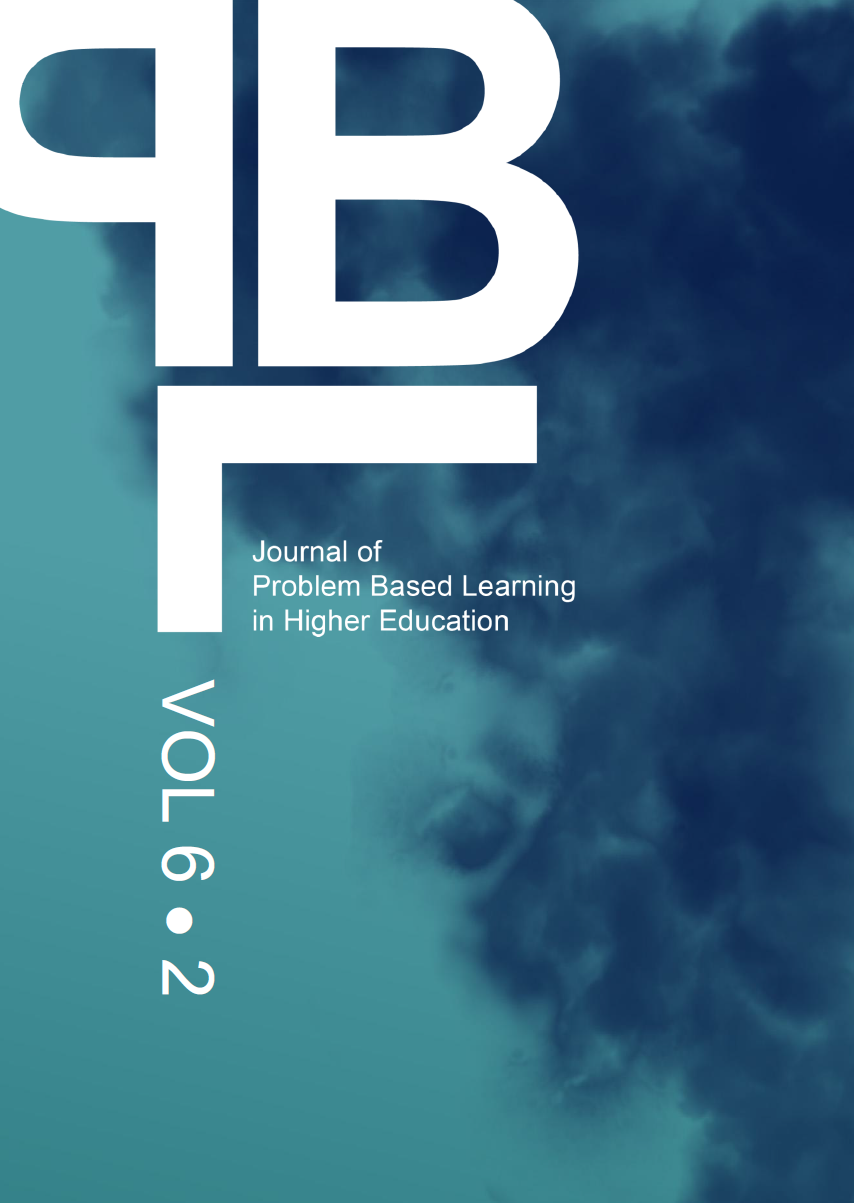Abstract
With the growing demand to use pedagogical approaches to foster 21st-century skills such as problem solving, creativity, critical thinking, collaborative learning and innovation, problem-based learning (PBL) has been the pedagogical approach chosen by many educational institutions. However, moving from traditional teaching to PBL demands an organisational change. Although organisational culture is widely recognised as a critical success factor in the implementation of PBL, the literature provides very limited insight into how it influences the implementation process of PBL. This paper provides an empirical analysis of the influence of organisational culture on PBL implementation. The research is based on the analysis of two groups that have been involved in implementing PBL for several years. A focus group interview was conducted with each group to identify traits of organizational culture. The Organizational Culture Assessment Instrument (OCAI) was applied to identify the dominant type of culture in each group. The findings indicated that some cultural traits better supported the implementation of PBL. In particular, traits of clan culture were identified to be more aligned with PBL principles. In addition, understanding the current culture of a given organisation enables people to be more aware of the level of change that is required to implement PBL in their organisations.
References
Barge, Scott. 2010. “Principles of Problem and Project Based Learning: The Aalborg PBL Model.”
Biloslavo, Roberto, and Mojca Prevodnik. 2010. “Impact of Organizational Culture on Knowledge Management in Higher Education.” In Cultural Implications of Knowledge Sharing, Management, and Transfer - Identifying Competitive Advantage, edited by Deogratias Harorimana. Information Sciences References.
Cameron, Kim, and Sarah Freeman. 1991. “Cultural Congruence, Strength, and Type: Relationships to Effectiveness.” Research in Organizational Change and Development 5:23–58.
Cameron, Kim, and Robert Quinn. 2006. Diagnosing and Changing Organizational Culture Based on the Competing Values Framework. Revised Edition. Jossey-Bass.
Cunliffe, Ann, and Matthew Eriksen. 2011. “Relational Leadership.” Human Relations 64 (11):1425–49.
Geertz, Clifford. 1973. The Interpretation of Cultures - Selected Essays by Clifford Geertz. New York: Basic Books.
Gioia, Dennis, and Kumar Chittipeddi. 1991. “Sensemaking and Sensegiving in Strategic Change Initiation.” Strategic Management Journal 12:433–48.
Goldring, Leslie. 2002. “The Power of School Culture.” Leadership 32 (2-):32–35.
Graaff, Erik de, and Anette Kolmos. 2003. “Characteristics of Problem-Based Learning.” International Journal of Engineering Education 19 (5):657–62.
Hatch, Mary, and Majken Schultz. 1997. “Relations between Culture, Identity and Image.” European Journal of Marketing 31 (5/6):356–65.
Heracleous, Loizos. 2001. “An Ethnographic Study of Culture in the Context of Organizational Change.” The Journal of Applied Behavioral Science 37 (4):426–46.
Hersted, L. 2016. “Relational Leading and Dialogic Process.” PhD-thesis, Aalborg, Denmark: Aalborg University.
Johansson, Catrin, Sture Åström, Anders Kauffeldt, Lars Helldin, and Eric Carlström. 2013. “Culture as a Predictor of Resistance to Change: A Study of Competing Values in a Psychiatric Nursing Context.” Health Policy 114 (2–3):156–62. https://doi.org/10.1016/j.healthpol.2013.07.014.
Jones, Mary C, Melinda Cline, and Sherry Ryan. 2006. “Exploring Knowledge Sharing in ERP Implementation: An Organizational Culture Framework.” Decision Support Systems 41 (2):411–34.
Jones, Renae A., Nerina L. Jimmieson, and Andrew Griffiths. 2005. “The Impact of Organizational Culture and Reshaping Capabilities on Change Implementation Success: The Mediating Role of Readiness for Change.” Journal of Management Studies 42 (2):361–86. https://doi.org/10.1111/j.1467-6486.2005.00500.x.
Keskin, Halit, Ali E Akgün, Ayşe Günsel, and Salih Zeki İmamoğlu. 2005. “The Relationships between Adhocracy and Clan Cultures and Tacit Oriented KM Strategy.” Journal of Transnational Management 10 (3):39–53.
Kolmos, Anette. 2010. “Premises for Changing to PBL.” International Journal for the Scholarship of Teaching and Learning 4 (1).
Kolmos, Anette, and Erik de Graaff. 2007. “Process of Changing to PBL.” In Management of Change. Implementation of Problem-Based and Project Based Learning in Engineering, edited by Erik de Graaff and Anette Kolmos, 31–44. SENSE PUBLISHERS.
Li, Huichun. 2013. Educational Change towards Problem Based Learning: An Organizational Perspective. Vol. 5. River Publishers.
Li, Huichun, Xiangyun Du, and Alex Stojcevski. 2009. “Educational Transformation to PBL- What Has Changed.” In . Victoria Unversity Press.
Martin, Joanne. 1992. Cultures in Organizations - Three Perspectives. Oxford: Oxford University Press.
Moesby, Egon. 2004. “Reflections on Making a Change towards Project Oriented and Problem-Based Learning (POPBL.” World Transactions on Engineering and Technology Education 3:269–78.
Patterson, W. 2000. “Grounding School Culture to Enable Real Change.” Education Digest 65 (9):4–8.
Pérez, Susana, José Manuel Montes, and Camilo José Vázquez. 2004. “Managing Knowledge: The Link between Culture and Organizational Learning.” Journal of Knowledge Management 8 (6):93–104. https://doi.org/10.1108/13673270410567657.
Quinn, Robert E., and John Rohrbaugh. 1981. “A Competing Values Approach to Organizational Effectiveness.” Public Productivity Review 5 (2):122–40. https://doi.org/10.2307/3380029.
———. 1983. “A Spatial Model of Effectiveness Criteria: Towards a Competing Values Approach to Organizational Analysis.” Management Science 29 (3):363–77. https://doi.org/10.2307/2631061.
Raj, Rahul, and Kailash B.L Srivastava. 2013. “The Mediating Role of Organizational Learning on the Relationship among Organizational Culture, HRM Practices and Innovativeness.” Management and Labour Studies 38 (3):201–23. https://doi.org/10.1177/0258042X13509738.
Sandoval, Maria, Rita Cortés, and Fulvio Lizano. 2015. “PBL in System Engineering Grades: A Bottom-Up Perspective.” In . San Sebastian, Spain: Aalborg : Aalborg University Press.
Savery, John. 2006. “Overview of Problem-Based Learning: Definitions and Distinctions.” The Interdisciplinary Journal of Problem-Based Learning (IJPBL) 1:9–20.
Schein, Edgar H. 2010. Organizational Culture and Leadership. Vol. 2. John Wiley & Sons.
Schultz, Majken. 2000. Kultur I Organisationer: Funktion Eller Symbol (Culture in Organizations: Function or Symbol). Copenhagen: Handelshøjskolens Forlag.
Smircich, L. 1983. “Concepts of Culture and Organizational Analysis.” Administrative Science Quarterly 28 (3):339–58.
Suppiah, Visvalingam, and Manjit Singh Sandhu. 2011. “Organisational Culture’s Influence on Tacit Knowledge-Sharing Behaviour.” Journal of Knowledge Management 15 (3):462–77. https://doi.org/10.1108/13673271111137439.
Umbach, Paul. 2007. “Faculty Cultures and College Teaching.” In The Scholarship of Teaching and Learning in Higher Education: An Evidence-Based Perspective, edited by Raymond Perry and John Smart. Springer.
Weick, Karl. 1995. Sensemaking in Organizations. London: Sage.
Articles published in Journal of Problem Based Learning in Higher Education are following the license Creative Commons Attribution 4.0 (CC-BY)
Authors retain copyright and grant the journal right of first publication with the work simultaneously licensed under a Creative Commons Attribution 4.0 International License (CC-BY). Further information about Creative Commons
